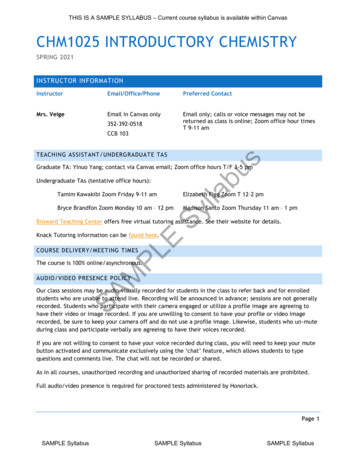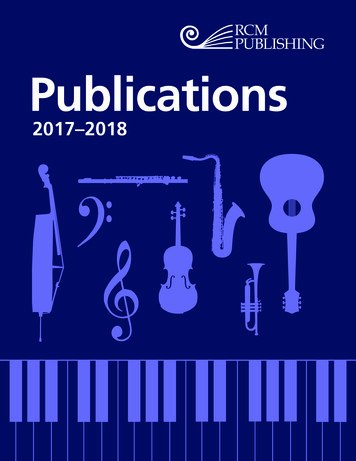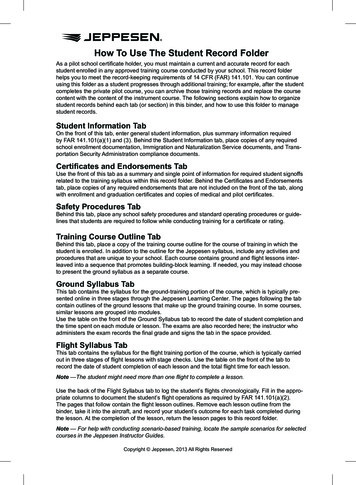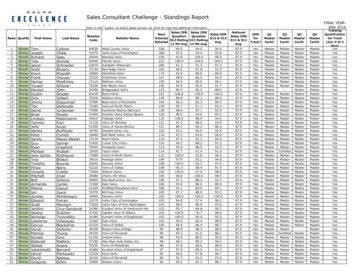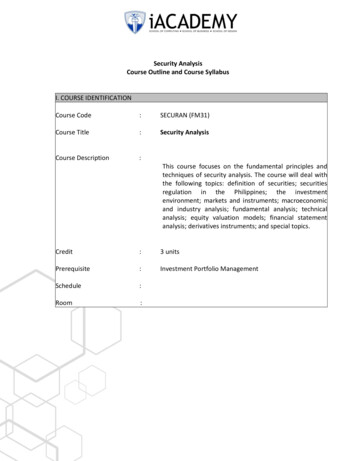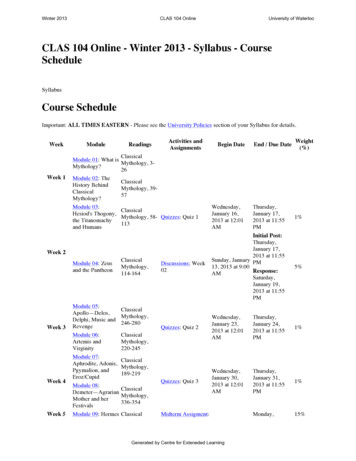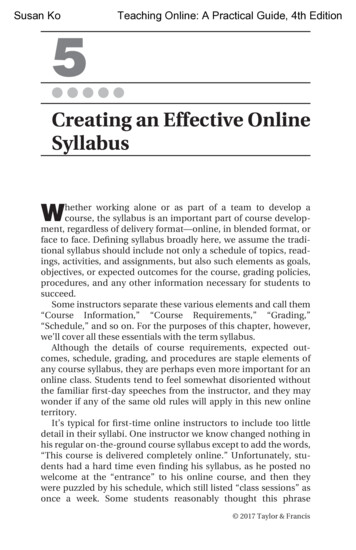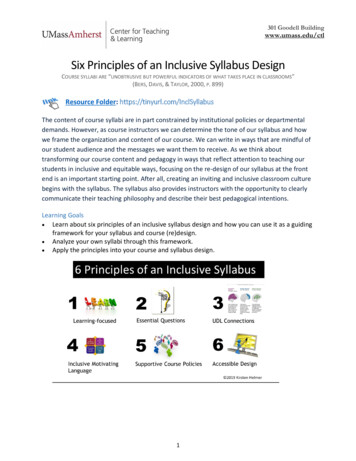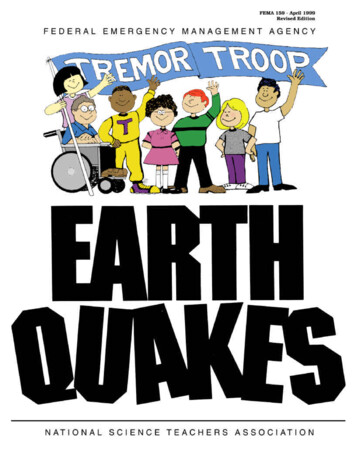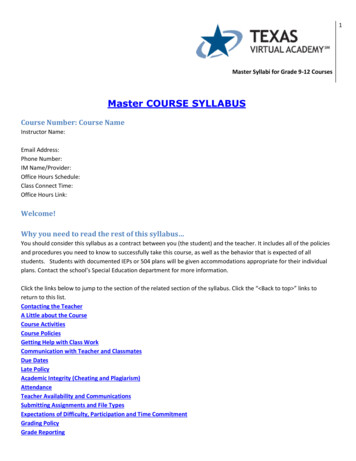
Transcription
1Master Syllabi for Grade 9-12 CoursesMaster COURSE SYLLABUSCourse Number: Course NameInstructor Name:Email Address:Phone Number:IM Name/Provider:Office Hours Schedule:Class Connect Time:Office Hours Link:Welcome!Why you need to read the rest of this syllabus You should consider this syllabus as a contract between you (the student) and the teacher. It includes all of the policiesand procedures you need to know to successfully take this course, as well as the behavior that is expected of allstudents. Students with documented IEPs or 504 plans will be given accommodations appropriate for their individualplans. Contact the school’s Special Education department for more information.Click the links below to jump to the section of the related section of the syllabus. Click the “ Back to top ” links toreturn to this list.Contacting the TeacherA Little about the CourseCourse ActivitiesCourse PoliciesGetting Help with Class WorkCommunication with Teacher and ClassmatesDue DatesLate PolicyAcademic Integrity (Cheating and Plagiarism)AttendanceTeacher Availability and CommunicationsSubmitting Assignments and File TypesExpectations of Difficulty, Participation and Time CommitmentGrading PolicyGrade Reporting
2Master Syllabi for Grade 9-12 CoursesContacting the TeacherIt is your responsibility to contact the teacher with any questions you may have. Don’t wait until the last minute—whena question arises, ask it early. When you have questions about course content or assignments, post them in theTeacher’s Office area. If you have private questions for me—for example, regarding a grade you received on anassignment—either submit those to me by kmail or through your Raise your Hand in your course. Alternately, you canalso visit me during Office Hours, or call my office phone—see the top of the syllabus for this information.If technical difficulties prevent you from contacting me online, please call my office phone (listed above). If my numberis long distance for you, leave me a message and I will call you back as soon as possible so I can pay for the call.A Little about the Course You can fill in this information for each course Course Number: Course NameSee course descriptions and Scope and Sequence aboveCourse length:Materials:Prerequisites:Course ActivitiesCourse activities may include: Reading online text and transcripts Viewing moving and static images and streaming video Listening to audio recordings and pronunciations Watching linear and interactive animations and simulations Completing hands-on and virtual activities Participating in threaded discussions with teachers and fellow students in a section, cohort, or group Teacher announcements Completing online self-check exercises Reading and completing teacher-created instructional materialsGraded assignments may include: Online or paper-based worksheets and practice sets Quizzes Exams (unit, semester and final) Threaded discussions Essays, research papers, and other writing assignments Presentation
3Master Syllabi for Grade 9-12 CoursesAll graded assignments are either automatically scored by the K12 Learning Management System, or they are teacherscored.
4Master Syllabi for Grade 9-12 CoursesCourse PoliciesAttendance and ActivityStudents are expected to log into this course daily. While the length of time that students spend working onassignments may vary, the expectation is that you will spend approximately 60 to 75 minutes on coursework each day.Daily Student ResponsibilitiesEvery time you enter the course and before completing any class work: Read any announcements I posted since the last time you entered the course. Review the Calendar and/or Weekly Announcement to see what lessons and assignments you are tocomplete that day. Check out the What’s New list at the bottom of the Course Home screen to see what’s gone on in thecourse since you last logged in. Look at the Course Checklist at the bottom of the Course Home page to review where you left off inthe course content since you last logged in. Complete all lessons and assignments (both graded and nongraded) as indicated on your coursecalendar before the end of the day. Submit assignments to me through the Dropbox tool, unless they are scored by the computer.Assignments sent by email will not be accepted unless you’ve made prior arrangements with me. Post any course questions you have in the the Raise Your Hand area found in each unit and returnlater for the answer.Before you log out of the course: Make sure you have completed all of the work for the day, including the nongraded lesson work. Go to the Course Checklist and check off the sections that you completed fully that day.Getting Help with Class WorkThis is going to be a challenging course. When you encounter difficulty with course content: First: Visit the Raise Your Hand area in the unit you’re working in. Check to see whether anotherstudent has asked the same question and whether I’ve already answered it. If not, then post yourquestion and check back later. I will answer questions posted here at least twice daily throughout theday. Next: Come to ClassConnect for LIVE instructions or Visit me in Office Hours, each held once a week(See my schedule at the top of the syllabus). If it is urgent or private: Send me k-mail or contact me using the phone number or online screen nameat the top of this syllabus.Communication with Teacher and ClassmatesAlthough you won’t be able to send k-mail to other students, you will be communicating with other students throughthe community area outside of the course and through threaded discussions within the course. In addition, students
5Master Syllabi for Grade 9-12 Coursesoften form friendships while in the course together. When this happens, students often share email addresses orinstant message names.Some things to keep in mind when communicating with other students: Respect the privacy and wishes of your fellow students. Flaming, spamming, bullying or other unwanted contact including inappropriate message content orattachments will be considered a breach of this policy. Infractions may result in disciplinary action bythe school administration.Due DatesThe course calendar and my weekly announcements will list which lessons and assignments you need to complete eachday. You’ll also find assignment due dates in the Course Details area of your student landing page and in the CourseChecklist at the bottom of the Course Home page. It is important that you stick to the course schedule indicated on thecalendar and in the announcements as well as the due dates for each assignment. Staying on schedule allows you tolearn along with your classmates. This is especially important as we all learn together through the threaded discussionsin the course.Late Policy—PLEASE READ CAREFULLYGraded Teacher assignments are subject to the Late Policy. They must be completed and submitted no later thanmidnight the second Sunday following the due date for that assignment to receive full credit for the work that has beensubmitted. Anything for that week that is not received by that Sunday will be considered missing and a grade of zerowill be entered for those missing assignments.Students can still submit work that has had zeros entered.Assignments not submitted by the due date are subject to late penalties as set by the late policy. The late policy is asfollows: Week 1 Late: 90% of points Week 2 Late: 80% of points Week 3 Late: 70% of pointsPlease note: Computer Graded Assignments are NOT subject to the late policy. Do not password protect computergraded assignments after the assignment date. Under extreme circumstances, due date extensions can be granted onassignments – not past the late date. It should never be assumed that these will automatically be granted. Due dateextensions must be requested before the due date of the assignment and on a school day. Requests received on orpast the due date, or on a non-school day will most likely not be granted.Academic Integrity (Cheating and Plagiarism)Students who submit work as their own, when it is not wholly and completely their own, are guilty of cheating and/orplagiarism and will receive a grade of zero on the entire assignment.Assisting other students in cheating or plagiarism is also considered academic dishonesty and students who do this willreceive a grade of zero on their assignment submission as well.
6Master Syllabi for Grade 9-12 CoursesThe first time a student fails to cite the source of information in an essay or research paper, he/she will be advised ofproper citation methods. Further infractions will result in the student receiving a grade of zero on the item orassignment.Students who are found guilty of cheating or plagiarism more than once will be referred to the school administrationfor breach of the school’s Behavior Code.I may use a technology that helps to prevent cheating for some tests. Before these tests, you will be prompted to installa small piece of software on your computer. You will be required to install this piece of software before taking theassessment. Once you access the test, you will be unable to copy, paste or open new browser windows or programsduring the assessment. If you experience any difficulty, contact K12 Customer Care for assistance. Contact meimmediately if Customer Care cannot resolve your issue.AttendanceRegular and daily attendance is required:You must log into the course and complete the scheduled work every school day.Unless otherwise specified, course log in is required even when assignments occur offline as you are expectedto review any updated announcements, What’s New items and threaded discussion responses daily.You should expect to spend 60 to 75 minutes each day reading, responding, and completing other activitiesboth online and offline.If you know you will not be able to log into the course on any given day, please contact me immediately by kmail. If you encounter technical difficulties, contact me by phone. If you do not contact me before missing anactivity, you can expect to hear directly from me.Students who continually fail to enter the course and show progress will be referred to the schooladministration.Teacher Availability and CommunicationsAfter the first two weeks of school, you’ll have a lot more freedom in your daily schedule. This goes for teachers aswell! This means that, although we’re both working in the course every day, we may be working at very different timesof the day. When you and I happen to be online and working at the same time, I might not be immediately available.Most of my day is spent responding to student questions in the Raise Your Hand area, grading and returningassignments, and answering k-mails and phone messages. Feel free to contact me when needed, but please understandthat I might be in the middle of one of these tasks, or helping another student at the time. You may need to leave me amessage if you call, or wait for a short time to receive answers online. Of course, I am always available during my officehours, which are listed at the top of this syllabus.I will read and respond to questions in the Raise Your Hand areas of the course several times throughout the day. Youcan expect an answer to a question posted in this area in less than one school day. Email questions and phonemessages will be returned no later than one school day.
7Master Syllabi for Grade 9-12 CoursesIf you would like to schedule time for a private conference, please request these at least three to five days before theday you are available. The more notice you provide me, the more likely I can be available at a time that is best for youand/or your parent/learning coach.Submitting Assignments and File TypesNames of files you submit Files you submit to me through the Dropbox tool should have a filename that indicateswhich assignment it is, followed by your first initial and last name. You may wish to use “U” and “L” to indicate whichunit and lesson it is, or simply shorten the actual title of the assignment. Some examples include “U4L3RSmith” (unit 4lesson 3 for Robert Smith) or “PersuaEssyRSmith” for Robert Smith’s Persuasive Essay.Always use the Dropbox I will only accept teacher-graded assignments submitted through the Dropbox tool.Assignments sent to me through k-mail or email will be returned to be submitted through the Dropbox. If for somereason you are unable to submit assignments through the Dropbox, or assignments you submit are not being returnedto you, contact me immediately. We will make alternate arrangements for you to get the assignments to me forgrading.File type and size At all times, attempt to keep the size of files you submit less than 3 MB.Unless otherwise indicated in the assignment directions, the only file types you should submit to me are .doc, .txt, and.tif. Assignments in other formats will be returned for resubmission.Doc Sharing There is an area in our course called Doc Sharing. I will occasionally upload documents to this area for youto download for use in class. Students can also upload files to this area. Please refrain from uploading files there unlessyou have asked my permission first. Students who upload files without permission will be referred to theadministration for breaking the school’s Acceptable Use Policy.Expectations of Difficulty, Participation and Time CommitmentStudents often find that going to school online takes longer and is more difficult than going to school in a traditionalsetting. Be prepared for this course and online schooling in general to be a little more difficult than you might expect. Ifyou are not spending at least 60 minutes on this course each day, you’re probably not doing enough to pass the class. Ifthis is happening, make an appointment to meet with me or visit me in Office Hours so we can review what you aredoing each day. If you need help in working out a personal schedule, staying motivated or creating an effective homelearning environment, contact your advisor. This person is an expert at helping students with these concerns!Grading PolicyIn the Course Home on the left-side of the course is an item titled Grading Information. In it you will find a summary ofthe graded assignments and assessments for this course. You will notice that some types of assignments are worthmore points, overall, than others. For example, it is very possible to take only computer-scored quizzes in this courseand get an A on each one, but still fail the course. This would happen because computer-scored quizzes make up asmall percentage of the total points in the course.When an assignment is to be submitted to me as an electronic file, I will only accept these through the course Dropbox.If you have technical difficulties using the Dropbox, contact me immediately to make other arrangements.
8Master Syllabi for Grade 9-12 CoursesI will grade and return all teacher-scored assignments within three school days and sooner whenever possible. Whenthese assignments are returned, you are expected to open them and read the feedback I provide directly in the files.Use this feedback to improve your work on future assignments.Threaded DiscussionsGrades are based on quality and timeliness. Responses should be well-written (Use the spell check tool.) and clearlyaddress the issue being discussed. Stay on topic.Threaded discussions usually last about three days. You are expected to respond to the original question or prompt onthe first day, then read and respond to others’ postings on the second day. On the third day, you should respond toothers’ responses to your original post.Grade ReportingYour gradebook will always display points earned vs. point’s possible as well as percentage grades. I will also provideletter grades that correspond to the percentage grades.Assignments will be graded and (in most cases) returned to you in three school days. Grades will appear in your onlinegradebook, and feedback to your work will most often be included directly inside the files that I return to you. back to top
CATEGORYInitial Response to Responded to the Responded to the Responded to the Responded to the Did not respondPromptinstructor's topic instructor's topic instructor's topic instructor's topic to the instructor'son time.one day late.two days late.more than twotopic.days late.Reply to Peers –1st RoundResponded to two Responded to two Responded to one Responded to one Did not respondMaster Syllabi for Grade 9-12 Coursespeer postings on peer postings one peer posting on peer posting one to any peertime (within two day late (within time (within two day late (within postings.days).three days).days).three days).Additional Reply Responded to at Responded to one Responded to one Responded to one Responded toto Peers – 2ndleast one moremore peer onemore peer twomore peer more none of the peersRoundpeer on time.day late.days late.than two dayswho have postedlate.comments to you.ContentAcceptableunderstanding ofcontent withsome minormisconceptionsrelated to coursecontent.Marginalunderstanding ofcontent withobviousmisconceptionsrelated to coursecontent.Content does notdemonstrateunderstanding ofcourse contentStudent’sStudent’sStudent’scomments addcomments addcomments addAppropriatesignificantly to the moderately to the minimally to theLength discussion bydiscussion bydiscussion.30–75 words of suggesting other suggestingStudent does notwell-written text solutions,solutions,substantiate anypointing outpointing outcomments madeproblems, or even problems, or even with reasoning orrespectfullyrespectfullysource citation.disagreeing.disagreeing.Student alsoStudent does notsubstantiates any substantiate anycomments made comments madewith reasoning or with reasoning orsource citation. source citation.Student’scomments do notadd to thediscussion.Posting is simple:"I agree" or "Yes"or "No."Student did notparticipate at allin the threadeddiscussion.Quality PostHigh-qualityCoherent contentcontent thatthat reflects basicreflects goodunderstanding ofconceptualmost contentunderstandingintroduced in theand completion of course.assignedcoursework.9
10Master Syllabi for Grade 9-12 CoursesTexas Course Content - HSAll Courses are approved by SAC and the Texas Virtual School Network.English 1 103 ComprehensiveEnglish 1 104 HonorsEnglish 2 203 ComprehensiveEnglish 2 204 HonorsEnglish 3 303 ComprehensiveEnglish 3 304 HonorsEnglish 4 403 ComprehensiveEnglish 4 404 HonorsAP English Language & Composition 500AP English Language & Composition 510Algebra IGeometry 202 CoreGeometry 203 ComprehensiveGeometry 204 HonorsAlgebra II 302 - CoreAlgebra II 303 - ComprehensiveAlgebra II 304 - HonorsPreCalculus-Trig 403Math ModelsAP Calculus 500AP Statistics 510Integrated Physical and ChemistryBiology 203 ComprehensiveBiology 204 HonorsChemistry 302 CoreChemistry 303 ComprehensiveChemistry 304 HonorsAP Chemistry 510Physics 403 ComprehensivePhysics 404 HonorsAP Physics 520Environmental Science 010AstronomyWorld Geography StudiesWorld History 102 CoreWorld History 103 ComprehensiveUS History 313 ComprehensiveUS History 314 HonorsAP US History 500Economics 413AP Macroeconomics 520 (Spring only)US Government 403AP US Government 510 (Spring only)Spanish I 100Spanish II 200Spanish III 300AP Spanish 500French I 110French II 210French III 310AP French 510Latin I 130Latin II 230German I 120German II 220Mandarin IMandarin IIPsychologyAP Psychology 540 (Spring only)SociologyComputer Science 1 (Computer Literacy Sem 1) 010Computer Science 1 (Computer Science Sem 2) 036AP Computer ScienceArt Appreciation (Fine Art) 010
11Master Syllabi for Grade 9-12 CoursesMoney Matters 030Journalism 010Communication Applications (Speech) - 020Music AppreciationHealth 010Reading Application and Study Skills (Reaching yourAcademic Potential) 040Physical Education
12Master Syllabi for Grade 9-12 CoursesENGLISH COURSESEnglish I - Literary Analysis and Composition IPEIMS Course Title/Number: English I/ 03220100Course Code: ENG-103V1TX-K 8Course Requirements/Prerequisite Requirements: Intermediate English A and B, or equivalentCredits to be earned: .5 credit per semester completion with grade of 70 or aboveCourse Description: Comprehensive Literary Analysis and Composition (English I)This course challenges students to improve their written and oral communication skills, while strengthening their abilityto understand and analyze literature in a variety of genres. They read a broad array of short stories, poetry, drama,novels, autobiographies, essays, and famous speeches, sharpening the close reading and critical analysis of classicworks of literature and helping them appreciate the texts and the contexts in which the works were written. Studentsbroaden their composition skills by examining model essays in various genres by student and published writers. Theyhone their writing skills through in-depth planning, organizing, drafting, revising, proofreading, and feedback. Theybuild on their grammar, usage, and mechanics skills with in-depth study of sentence analysis and structure, agreement,and punctuation, reinforced by online activities. Student vocabularies are enhanced through the study of Greek andLatin root words, improving students’ ability to decipher the meanings of new words.Materials provided by K12 – Classics for Young Readers, Volume 8; Classics for Young Readers, Volume 8: An AudioCompanion; BK English Language Handbook, Level 1; Vocabulary from Classical Roots, Book C; The Narrative of the Lifeof Frederick Douglass, An American Slave, by Frederick Douglass; Anne Frank: Diary of a Young Girl, by Anne Frank;Romeo and Juliet, by William ShakespeareMaterials required by the student – noneCourse description: Honors Literary Analysis and Composition (English I)This course challenges students to improve their written and oral communication skills, while strengthening their abilityto understand and analyze literature in a variety of genres. They read a broad array of short stories, poetry, drama,novels, autobiographies, essays, and famous speeches, sharpening the close reading and critical analysis of classicworks of literature and helping them appreciate the texts and the contexts in which the works were written. Studentsbroaden their composition skills by examining model essays in various genres by student and published writers. Theyhone their writing skills through in-depth planning, organizing, drafting, revising, proofreading, and feedback. Theybuild on their grammar, usage, and mechanics skills with in-depth study of sentence analysis and structure, agreement,and punctuation, reinforced by online activities. Student vocabularies are enhanced through the study of Greek andLatin root words, improving students’ ability to decipher the meanings of new words.Also added are the Honors projects. In Semester 1 it is Unit 9: Honors Project 2: Descriptive Essay -Students read threeliterary models and then write their own descriptive essay, demonstrating their advanced composition skills. Students
13Master Syllabi for Grade 9-12 Coursesrespond as both a reader and as a writer to model descriptive essays: Hamlin Garland's "A Night Ride in a PrairieSchooner"; an excerpt from Walden by Henry David Thoreau; and Pilgrim at Tinker Creek by Annie Dillard. They look atcharacter; events; problem/conflict; resolution of conflict; theme; language; tone; voice; and purpose. Then studentschoose a topic for their descriptive essay; determine purpose and audience; brainstorm and develop details; anddetermine a pattern of organization. They write a descriptive essay about a place, using a tone, style, and voice thatcommunicate the meaning of that place. In Semester 2 it is Unit 10: Honors Project: Novel Choice - Students read anadditional novel of their choice from an approved list. Choices include Animal Farm by George Orwell, Jane Eyre byCharlotte Bronte, Lord of the Flies by William Golding, A Separate Peace by John Knowles, A Tale of Two Cities byCharles Dickens, To Kill a Mockingbird by Harper Lee, and The Yearling by Marjorie Kinnan Rawlings.Course Scope and SequenceSemester 1Unit 1: Autobiographically SpeakingStudents read four different memoirs and explore the kind of language those authors use to make the experiencescome alive for the reader. Semester 1 Introduction What is Autobiography? "A Cub Pilot" From "Barrio Boy" “No Gumption” From I Know Why the Caged Bird SingsUnit 2: MemoirStudents get hands-on practice with the memoir form. They analyze Mark Twain's "A Cub Pilot" from the perspective ofa writer. Then students go on to plan and write a memoir based on a personal experience. Looking at "A Cub Pilot" with a Writer's Eye Planning a Memoir Memoir Techniques and Planning Writing a Memoir Revising a Memoir Proofreading and Publishing a MemoirUnit 3: Short StoriesStudents identify elements of a short story and analyze how authors use each element to create powerful andprofound effects on a reader with a limited amount of prose. "The Glass of Milk" "Gumption" "To Build a Fire" "The Secret Life of Walter Mitty"
14Master Syllabi for Grade 9-12 Courses "The Piece of String"Reflect and Review"The Tell-Tale Heart""The Lottery""The Lady or the Tiger?"Unit 4: ArgumentStudents read a model argument and analyze it. Then, they conceive, plan, draft, revise, proofread, and publish anargument of their own. What Is an Argument? Choosing a Topic and Gathering Information Planning and Organizing the Argument Recognizing Logical Fallacies and Emotional Appeals Writing an Argument Revising an Argument Proofreading and Publishing an ArgumentUnit 5: To Everything There Is a SeasonStudents read several poems that deal with the seasons. They focus on the issues these pieces address, the feelingsthey convey, how the ideas relate to specific times of year, and imagery and symbolism that poets use. “Spring and Fall” "in Just-" and "July" “To Autumn” "It Sifts from Leaden Sieves" and "The Snow-Storm"Unit 6: Novel ChoiceStudents read a novel of their choice from an approved list. Choices include Animal Farm by George Orwell, Jane Eyreby Charlotte Bronte, Lord of the Flies by William Golding, A Separate Peace by John Knowles, A Tale of Two Cities byCharles Dickens, To Kill a Mockingbird by Harper Lee, and The Yearling by Marjorie Kinnan Rawlings. Read Novel ChoiceUnit 7: Literature Semester 1 Review and TestStudents take computer-scored and teacher-graded exams to demonstrate mastery of the objectives from thissemester.Unit 8: Honors Project 1: AntigoneStudents read the ancient Greek play Antigone. They explore the conflict between Creon and Haimon, examine themesof loyalty and tyranny, analyze the importance of the play's setting in influencing the way characters think and behave,
15Master Syllabi for Grade 9-12 Coursesand identify choices and possible consequences of those choices. They communicate these ideas through a final writtenproject that shows original thought, critical analysis, and the ability to support their conclusions with examples from thetext. Read AntigoneUnit 9: Honors Project 2: Descriptive EssayStudents read three literary models and then write their own descriptive essay, demonstrating their advancedcomposition skills. Students respond as both a reader and as a writer to model descriptive essays: Hamlin Garland's "ANight Ride in a Prairie Schooner"; an excerpt from Walden by Henry David Thoreau; and Pilgrim at Tinker Creek byAnnie Dillard. They look at character; events; problem/conflict; resolution of conflict; theme; language; tone; voice; andpurpose. Then students choose a topic for their descriptive essay; determine purpose and audience; brainstorm anddevelop details; and determine a pattern of organization. They write a descriptive essay about a place, using a tone,style, and voice that communicate the meaning of that place. Seeing with the Mind's Eye: Beauty Seeing with the Mind's Eye: Nature Seeing with the Mind's Eye: Wonders Planning a Descriptive Essay Recognizing Descriptive Language Writing a Descriptive Essay Polishing a Descriptive EssaySemester 2Unit 1: Two Great SpeechesStudents read and listen to Abraham Lincoln’s “Gettysburg Address” and Dr. Martin Luther King Jr.’s “I Have a Dream.”Then they create a speech of their own, on a topic of importance to them. They plan, take notes, and write the speech,then practice and deliver it to an audience. Analyzing a Speech: A President Speaks Analyzing a Speech: A Civil Rights Leader Speaks Planning a Speech Writing a Speech Practicing and Revising a Speech Delivering a SpeechUnit 2: Student Choice AutobiographyStudents have their choice of the following autobiographies: Anne Frank: The Diary of a Young Girl or Narrative of theLife of Frederick Douglass. They read the autobiography and check their comprehension by analyzing character, setting,theme, point of view, tone, mood, and motif.Unit 3: Research Paper
16Master Syllabi for Grade 9-12 CoursesIn this unit, students learn about the process of writing a research paper. Students complete substantial research andprepare their research paper through prewriting, drafting, and revising phases. What Is a Research Paper? Finding Information Taking Notes Organizing the Information Conference Day Writing a Research Paper Creating a Works Cited Page Revising a Research Paper Proofreading and Publishing a Research PaperUnit 4: Voices and ViewpointsStudents explore how each of the poets espouses a particular view that conveys the theme of a poem. They alsoexamine the effects of sound qualities (including rhyme scheme and meter) in these poems. "The Rainy Day" and "Invictus" "We Real Cool" and "The Negro Speaks of Rivers" "Mending Wall" Shakespeare's Sonnets 18 and 29Unit 5: Literary Essay About ThemeIn this unit, they choose one poem they have read and will plan and write a short essay analyzing its theme. What Is a Literary Essay About Theme? Planning a Literary Essay
Master COURSE SYLLABUS Course Number: Course Name Instructor Name: Email Address: Phone Number: IM Name/Provider: Office Hours Schedule: Class Connect Time: . If you have private questions for me—for example, regarding a grade you received on an assignment—either submit those to me by kmail or through your Raise your Hand in your course .

